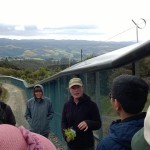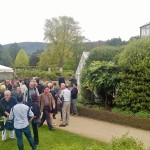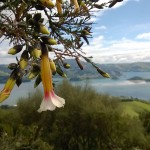347 delegates from 45 countries gathered in Dunedin, New Zealand for the 5th Global Botanic Garden Congress which closed on Friday October 25th 2013. Despite a slight lingering jet-lag, I am filled with a sense of rejuvenation and optimism after having attended the congress.

Thank you
I would like to thank the organizers, Alan Matchett and the team from Dunedin Botanic Garden, The Botanic Gardens Australia & New Zealand (bganz) and Botanic Garden Conservation International (BGCI) for an exceptional congress. The conference programme, food and social events were all outstanding and the sense of warmth and welcome from the local community was very special.
“Me te mihi nui mō ō manaakitanga, tēnā koe i ō manaakitanga mai, me te aroha tino nui, kia ora tātou katoa.”
I thank you for your kindness, I thank you also for your hospitality and we will have very fond memories of our visit. I wish good health to you all.
I would also like to thank everyone who visited us at the exhibit. As this was our first time exhibiting south of the equator, it was an extra pleasure to talk to so many representatives from gardens based in Asia and the Australian continent, whom we had not met before. Due to prior commitments, I was the only one from the our team able to attend the congress, and I apologise for sometimes being too busy to look after all our visitors properly. However, we are available to answer any queries you may have by phone or email in the months to come. Also, please note that we have software tools to host online meetings, support and training.
What did we learn?
- At the 4th GBGC in Dublin in 2010, we learned that version 2 of our product, although fine, lacked many features that gardens were looking for. With version 3, introduced in 2011, many new features were introduced, including integrated mapping, support for handheld devices and a web solution for visitors. Our close collaboration with the community has been worthwhile. At this congress, we could clearly see that the scope and features fit very well with the requirements gardens have in 2013. Not only was this confirmed through the discussions we had at our exhibit, but also during several of the congress sessions. However, we will not be resting on our laurels, but will carry on working and evolving with the botanic garden community, with a view to helping you the best we can.
- The new tours feature in Explorer was very well received. The “tours” are not only a great help for visitors to your garden, but are also an excellent tool for educational purposes.
- Some gardens and arboreta have Geographic Information Systems (GIS) requirements beyond the scope of their plant records system. For example gardens with a high frequency of landscaping or other construction work. They may use GIS tools for facility management or to perform advanced geoprocessing of the plant collection. For these gardens, we are working together with Esri to enable a tighter integration between ArcGIS and the plant record system. More information will follow later this year.
- Many of the sessions at the congress focused on plant conservation and in particular, the Global Strategy of Plant Conservation targets for 2020. As the global community of Botanic Gardens work together to reach these targets, it is vital that the community has tools and data available to measure the rate of success. It is obvious that correct and up-to-date plant records have never been more important.
- We already look forward the 6th Global Botanic Garden Congress, hosted by the City of Geneva, Switzerland in 2017.
Looking to the future
The Friday plenary sessions chaired by the new BGCI chairman, Prof. Stephen Blackmore was a perfect ending to a great congress. We were all inspired by the presentation “How to be a conservation garden” by Dr Jin Chen from the Xishuangbanna Tropical Botanical Garden and “Ecological restoration and the role of botanic gardens in restoring damaged habitat” by Dr Kathy MacKinnon at the “World Commission on Protected Areas”.
Prof. Peter Wyse-Jackson from Missouri Botanical Garden rounded off the

congress by first looking back on the achievements the community has made and forward to the future challenges for botanical gardens:
- Linking plant conservation and environmental protection to world priorities.
- Raising our game in plant conservation.
- Working together more efficiently.
- Providing increasingly effective leadership in sustainability and environmental education.
- Pushing boundaries in plant science.
- Sustaining botanic gardens to build on the achievements of the last few decades.
To be able to handle these challenges, proper tools are needed and we are committed to help as best we can.
Conclusion
Not only is the GBGC congress a great opportunity for us to meet existing users, make new friends and promote the work we do, but it is also an invaluable source of inspiration and guidance on how we should move forward with our work.
If you did not have a chance to talk to us at the conference, please in touch.
Links
Organisers
- 5th Global Botanic Garden Congress
- Dunedin Botanic Garden
- Botanic Gardens Australia and New Zealand
- Botanic Gardens Conservation International
- 5 GBGC Youtube channel
Dunedin attractions
News
- BGCI news: 5thGlobal Botanic Garden Congress – a great success
- Otago Daily Times: An ‘exceptional’ Botanic Gardens Congress
- Xishuangbanna Tropical Botanical Garden news: Chen Jin attends 5th Global Botanic Gardens Congress
Hosts, 6th Global Botanic Gardens Congress 2017



